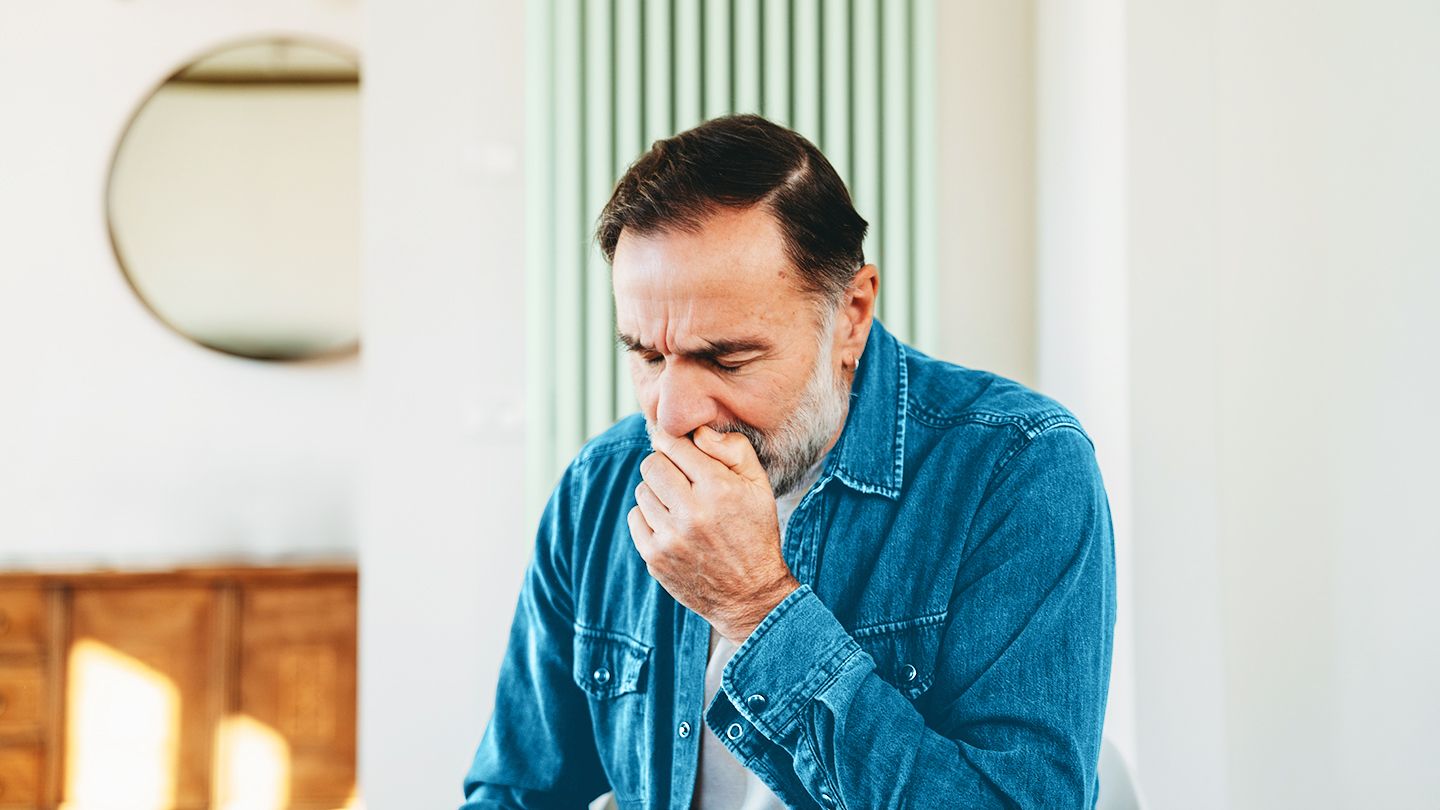A cough is one of the most common symptoms that sends people to the doctor. As many as 30 million medical visits are related to coughing. Most coughs are caused by upper respiratory infections like a cold or bronchitis.e60dc2a1-f33c-4a05-9b50-8e3e8e5976294eebfc3a-1472-4f9e-8221-6b8343bccaab But a cough that lasts for several weeks, gets worse over time, or is accompanied by symptoms like unexpected weight loss or trouble breathing could warn of lung cancer.e60dc2a1-f33c-4a05-9b50-8e3e8e59762929903b71-c7e0-4a90-8934-8701cb719f54 Many different coughs are symptoms of lung cancer . The type of cough depends on where the tumor is located and how it affects the lungs, but there isn’t one specific type of cough that would indicate lung cancer.e60dc2a1-f33c-4a05-9b50-8e3e8e59762940f311d8-f363-4aaf-91a2-4eeb566b5443
What Does a Lung Cancer Cough Feel Like? How It Feels A lung cancer cough can differ from person to person. In general, a cancer-related cough will feel dry and not improve with medications or other remedies. “Unlike coughs caused by infections, which may resolve over time or respond to antibiotics, a lung cancer cough typically lingers and may gradually worsen,” says Fatemeh Ardeshir-Larijani, MD , a thoracic oncologist at Winship Cancer Institute of Emory University in Atlanta. People with lung cancer describe their coughs as: Chronic and drye60dc2a1-f33c-4a05-9b50-8e3e8e597629065bf89f-eeea-47e0-9816-6f1306aad1d9 A feeling of pressure or tightness in their cheste60dc2a1-f33c-4a05-9b50-8e3e8e5976295986f832-d632-4983-89a1-c0fd83dd59a6 Shortness of breathe60dc2a1-f33c-4a05-9b50-8e3e8e59762960d970f9-86d7-43ec-9204-50e7e7fea0d1 Coughing up bloode60dc2a1-f33c-4a05-9b50-8e3e8e59762960d970f9-86d7-43ec-9204-50e7e7fea0d1 The type of cough depends on the tumor’s location. For example, coughing up blood may be a sign that the cancer has invaded a blood vessel in the lung, says Dr. Ardeshir-Larijani. And if the tumor blocks an airway, it can cause pneumonia , resulting in a mucus-filled cough. “These variations in cough characteristics can offer important clues in diagnosing and managing lung cancer,” says Ardeshir-Larijani. The likelihood of having a cough at the time of lung cancer diagnosis depends on the type and stage of the cancer. A cough is the most common symptom in people with advanced lung cancer, affecting about 34 percent of those with stage 4 lung cancer when diagnosed.e60dc2a1-f33c-4a05-9b50-8e3e8e597629a17de449-7d6d-4430-905f-6a6907351cef Nearly 41 percent of people with small-cell lung cancer (SCLC) have a cough. But almost 60 percent of those with stage 1 lung cancer have no cough or other symptoms at diagnosis.e60dc2a1-f33c-4a05-9b50-8e3e8e597629a17de449-7d6d-4430-905f-6a6907351cef The location of the cancer also influences the likelihood of coughing. “About 60 to 70 percent of patients with central tumors report a persistent cough at diagnosis,” says Ardeshir-Larijani. “It’s less common with tumors in the outer parts of the lungs.” Even though coughing can be a lung cancer symptom , only a very small percentage of people with chronic coughs have lung cancer. Coughing is more often a normal response meant to help keep the body healthy. “A cough is a way for us to clear things from our airway and from deep within the chest so that they can’t cause injury or harm to us,” says Cherie Erkmen, MD , a professor of thoracic surgery at Temple Health Systems in Philadelphia.
Causes of Lung Cancer Cough Causes A chronic cough is a response to irritation, inflammation, or a blockage in the airway. Lung cancer can cause all these problems. Most lung cancers that cause coughs are based in the central airways — the trachea (windpipe) and bronchi, which are the largest breathing tubes in the body. These airways are lined with cough receptors, which stimulate coughing when irritated by cancer cells.e60dc2a1-f33c-4a05-9b50-8e3e8e59762978ea5893-e3ae-4ce1-83d2-e3ace21b0f9b Cancer cells sometimes spread to the membranes that surround the lungs, called the pleura. This causes a buildup of fluid called a pleural effusion. The extra fluid makes it harder for the lungs to expand. A cough can be a symptom of pleural effusion.e60dc2a1-f33c-4a05-9b50-8e3e8e59762995bbd959-394f-4e39-ae4c-f0860462cc37 These multiple causes behind lung cancer coughs are why there is no specific type of cough associated with lung cancer, and why some patients experience a cough and others do not.
Lung Cancer Cough Treatments Treatments Treatment for a lung cancer cough depends on its cause. “If the cough is caused by the tumor itself, treating the cancer through chemotherapy, radiation, immunotherapy, or targeted therapy can shrink the tumor and reduce the cough,” says Ardeshir-Larijani. Other treatments target the cough specifically. Cancer Therapies Certain treatments destroy cancer cells in the lungs and elsewhere in the body. By shrinking tumors, these therapies also reduce coughing:e60dc2a1-f33c-4a05-9b50-8e3e8e597629ff33a5ee-d6f2-4948-9ce2-ef7d35399c75 Radiation therapy uses high-energy X-rays aimed at the body from a machine to kill cancer cells. It may be used before or after surgery, and is often combined with chemotherapy. Chemotherapy kills cancer cells with strong medicines given as a pill or through an IV. Immunotherapy helps the immune system attack lung cancer cells. Targeted therapy blocks certain proteins or chemicals that help the cancer grow. Lung Drainage If coughing is caused by fluid buildup in the lungs, draining the fluid can relieve this symptom. A doctor places a needle into the pleural space (you will likely be given a local anesthetic). The needle is attached to a drainage tube and a collection bag. Fluid drains out over a period of a few hours.e60dc2a1-f33c-4a05-9b50-8e3e8e597629b54e4c73-5053-4b91-a157-b773f3894fe1 Home Remedies You may be able to relieve a lung cancer cough at home. Ask your medical team about these remedies:e60dc2a1-f33c-4a05-9b50-8e3e8e59762923c96dd4-1d18-4fda-bb0c-6604b3eebf82 Drink 6 to 8 glasses of water a day to stay properly hydrated. Breathe in steam from a humidifier.e60dc2a1-f33c-4a05-9b50-8e3e8e5976299ad998c3-696f-4d6b-85c3-73ddc4df8aa5 Take an over-the-counter cough suppressant. Drink tea or warm water mixed with honey. Suck on cough lozenges. Practice deep breathing exercises. Sit upright to clear phlegm from the lungs.
When to See a Doctor When to See a Doctor Most coughs aren’t caused by lung cancer. They usually come with conditions like a cold, asthma, or allergies, says Ardeshir-Larijani. The time to be more concerned is when a cough lasts longer than 8 to 12 weeks, or is accompanied by symptoms like coughing up blood, chest pressure, unexplained weight loss, and tiredness. “While these signs don’t always mean cancer, they should be checked by a doctor, especially if you’re at higher risk [for lung cancer],” says Ardeshir-Larijani. By the time a cough or other symptom appears in lung cancer, the cancer may have progressed to a late stage when it’s harder to treat. “That’s why it’s critically important that people who are at high risk of lung cancer participate in a screening program,” says Dr. Erkmen. The American Cancer Society recommends that adults ages 50 to 80 who have smoked the equivalent of one pack of cigarettes a day for at least two decades get screened for lung cancer with a yearly low-dose computed tomography (CT) scan .e60dc2a1-f33c-4a05-9b50-8e3e8e597629c624b73f-594f-480e-8bd7-56d0a9d37c46 The U.S. Preventive Services Task Force (USPSTF) has a more limited guideline, recommending this screening only if you meet the two previously mentioned requirements and currently smoke or have quit within the past 15 years.e60dc2a1-f33c-4a05-9b50-8e3e8e59762956ac5e8c-c3c2-403d-bf8d-9a485ab6e631 Even if you’re not a current or former smoker, see a doctor if the cough lasts for more than a few weeks.
The Takeaway A chronic cough can be a symptom of many different conditions, including a respiratory infection, allergy, or lung cancer. Not everyone who has lung cancer has a cough — many people are symptomless or have limited symptoms. There are a variety of ways to relieve a cough caused by lung cancer, including treating the cancer itself or treating the cough directly. If you have a chronic cough, see your doctor to determine the cause.
Resources We Trust Mayo Clinic: Lung CancerCleveland Clinic: Lung CancerLung Cancer Foundation of America: How to Detect Lung Cancer, Early Detection and MoreRoswell Park Comprehensive Cancer Center: A Cough That Won’t Quit: Is It Lung Cancer?MD Anderson Cancer Center: ‘How I Knew I Had Lung Cancer’: Three Survivors Share Their Stories
Read the full article here
Leave a comment




